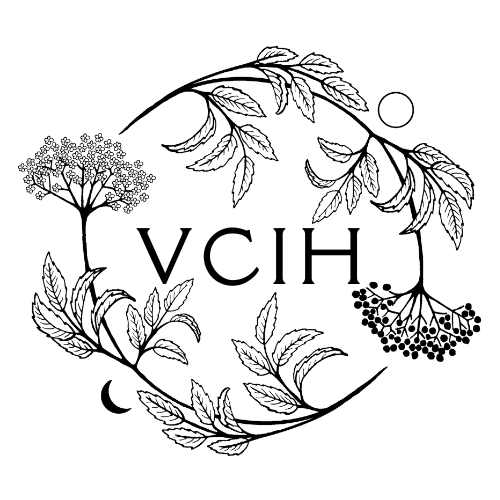FAQs FOR ALL PROGRAMS
FAQs are categorized by program, so be sure to select the relevant tab below. Please feel free to get in touch if you have questions not covered here.
Yes and No. Yes, in that we do offer the bulk of our coursework virtually, via live online classes. And, in-person attendance is no longer required for our Family program and only one in-person intensive is required for our Clinical program. You can live anywhere with internet and a compatible time zone and enroll in our programs.
But, we’re not exclusively online, as we offer one 6-day, in-person intensive for each program every summer. We’re committed to continuing to offer in-person and on-the-land experiences in Central Vermont.
Our format is also different from many other online programs in which students go at their own pace and engage with other students and faculty primarily via forums. Instead, our programs use a cohort model where all students move through the curriculum simultaneously, attending classes live and interacting with each other and faculty in real time, each week. We focus a great deal on building community and student relationships and our students tell us that they are surprised by how engaged and connected they feel, despite being online.
No. Our Herbal Roots Apprenticeship is offered in person, with all classes held outside under our big event tent and in the gardens. However, we do start the year in early spring with three online class days until the weather warms up and the ground thaws completely.
Mondays, 9-5 ET
Most days include a 1.25 hour lunch break plus multiple 10-15 minute breaks throughout the day..
There is no class the last week of August or the first week of September.
Wednesdays, 9-5 ET
Most days include a 1.25 hour lunch break plus multiple 10-15 minute breaks throughout the day and between classes.
- Year 1: Wednesdays, 9-5 ET
- Year 2: Thursdays, 9-5:30 ET and Fridays 9-5 ET. There are also 6 Saturday sessions, meeting about once per month, approximately 10 – 5 pm ET.
- Year 3: Mondays, 1-8 ET and Tuesdays, 9-6 ET
Most days include a 1.25 hour lunch break plus multiple 10-15 minute breaks throughout the day and between classes.
Yes! We take two weeks off in May, three weeks off in August, one week around Thanksgiving or Indigenous People’s Day. The year ends mid-December and, for folks continuing into future years, classes start again in mid-February.
There are two 6-day intensives each year of the program. The first takes place online at the start of the year (mid-February for all students) and one in-person intensive occurs during the summer months (May – August), depending on which program you’re in. Applicants are given exact dates with their acceptance letter.
Yes and No. Yes, students are responsible for engaging with all of the content offered during both 6-day intensives, but travel to Vermont is not required.
Our yearly orientation intensive in February takes place online, while a summer intensive is offered in-person each year in Vermont. We highly encourage students to attend the summer intensive in-person, but we understand that travel is an obstacle for a variety of financial, health, family and other reasons. Therefore, in-person attendance is not required at the Family program summer intensive.
Students who don’t attend the summer intensive in-person receive the material being covered via recordings of prior live classes and are supported to move through the material at their own pace over the course of the intensive week. Despite being at home, students will still need to make time to engage with the material in order to be ready to proceed with the curriculum when online classes resume the following week.
Yes and No. Yes, students are responsible for engaging with all of the content offered during intensives, but No, students do not have to travel to Vermont every year.
Our yearly orientation intensive in February takes place live online, while the summer intensives are offered in person each year. We highly encourage students to attend summer intensives in person, but we understand that travel is an obstacle for a variety of financial, health, family and other reasons.
Therefore, in-person attendance is not required at summer intensives in the first or third year of the program, however students are required to attend the year 2 summer intensive in-person, which focuses on clinical skills. (If the in-person requirement presents a non-negotiable obstacle to program participation, contact us to discuss your circumstances. Exceptions may be available to accommodate disability, for example, but must be arranged during the application process.)
Students who don’t attend year 1 or 3 summer intensives in-person receive the material being covered via recordings of prior live classes and are supported to move through the material at their own pace over the course of the intensive week. Despite being at home, students will still need to make time to engage with the material in order to be ready to proceed with the curriculum when online classes resume the following week.
We use Zoom for Education, an expanded-capacity and more secure version of Zoom, coupled with GSuite for Education (aka Google Workspace), which we have been using for the past 10 years to host student email, a robust online classroom platform, school calendar, student forum and document storage.
All classes will be offered as synchronous, interactive, live content and will also be recorded and provided to students for review or make up. All classes are closed captioned and auto-transcribed, as well.
Yes and No. Yes, students are responsible for engaging with all of the content offered during intensives, but No, students do not have to travel to Vermont every year.
Our yearly orientation intensive in February takes place live online, while the summer intensives are offered in person each year. We highly encourage students to attend summer intensives in person, but we understand that travel is an obstacle for a variety of financial, health, family and other reasons.
Therefore, in-person attendance is not required at summer intensives in the first or third year of the program, however students are required to attend the year 2 summer intensive in-person, which focuses on clinical skills. (If the in-person requirement presents a non-negotiable obstacle to program participation, contact us to discuss your circumstances. Exceptions may be available to accommodate disability, for example, but must be arranged during the application process.)
Students who don’t attend year 1 or 3 summer intensives in-person receive the material being covered via recordings of prior live classes and are supported to move through the material at their own pace over the course of the intensive week. Despite being at home, students will still need to make time to engage with the material in order to be ready to proceed with the curriculum when online classes resume the following week.
You will need access to a computer with high speed internet during class days and throughout each week. Hard-wired connections (vs. wifi) work best for Zoom, if possible. We strongly recommend students use laptop or desktop computers with cameras and audio enabled, as phones and tablets do not support the full functionality of Zoom or Google Classroom, both of which are required for participation in live classes, note-taking, and for completion of homework throughout each week.
You will need access to a computer with high speed internet during the first 3 class days in order to participate via the Zoom platform. We strongly recommend students use laptop or desktop computers with cameras and audio enabled, as phones and tablets do not support the full functionality of Zoom or Google Classroom, both of which are required for participation in these live classes.
After the first few weeks, students will need access to a computer weekly, on Sundays, at minimum in order to receive information about class the next day, as well as to engage with any resources posted in the virtual classroom.
We use an expanded-capacity version of the Zoom platform, intended for educational use, which provides more security along with closed captioning and auto-transcription. The classes first few classes are recorded for future access for students, as needed.
We use GSuite for Education (aka Google Workspace), which gives each student access to a student email, along with the Google Classroom platform, where we post all of the materials and handouts for the program. Students also get access to our school calendar, a student forum and document storage.
Yes, student clinic is virtual. Clinical interns in the third year see clients and receive supervision while remaining in their home communities and working with clients in any location. All clinical appointments are online; students do not have the option to see clients in person as part of their supervised internship.
The Family and Clinical programs require live attendance at 65% of classes; you can complete up to 35% of classes asynchronously by viewing the recording and completing an additional make-up assignment. But this is a very participatory learning environment, with regular class times and assignments, and regular attendance is a requirement of both programs.
We strive to create an environment and community that is inclusive and affirming of diverse ways of learning and knowing, is trauma-sensitive, and acknowledges the barriers often present in traditional learning environments for disabled, chronically ill and neurodivergent folks. We also recognize that financial limitations, caregiving, and other individual and systemically-driven circumstances can impact student access to learning. While we can’t always mitigate these barriers for students, we strive to create flexible, supportive, and empowering experiences for the widest range of learners possible with the resources and skills available to us.
The foundation of our learning environment is the relational culture we build with each cohort, which prioritizes interdependence while embracing difference. While our programs are structured and academically rigorous, students are encouraged to engage material and assignments according to their strengths and learning goals. We foster a collaborative, non-competitive classroom and guide students to share resources and strategies for learning. Faculty are available to support students in tailoring assignments to their needs and deadlines can be flexed with prior communication. When circumstances prevent students from attending live, we have a system to support engagement after-the-fact (though this option is not unlimited). We have a teaching assistant and Academic Coordinator available for individualized academic support, while faculty advisors support students’ personal journey through the program. Students also meet each week with their advising group to connect and offer and receive resources and care.
While our online format is intended to expand access to a broader range of students, we also recognize that for some, the online format is itself a barrier and limits access to our programs. While we regret this impact, we have chosen to prioritize making herbal training (especially at the clinical level) more broadly available to the widest range of communities and locations beyond Central Vermont.
You can read our full accessibility information sheet here. Applicants and current students are also invited to ask any questions they have or request additional supports at any time. We do our best to be transparent about what we offer, the nature of our virtual and physical spaces, and the limitations of our structure and staffing. Please reach out if you need information we haven’t provided.
You can find a detailed description of our policies and practices here. By enrolling in any of our programs, you are agreeing to abide by these policies.
The tuition reflects a rate of $14/classroom hour for Herbal Roots Apprenticeship (which includes medicine-making materials) and ~$13/classroom hour for Family and Clinical Programs. We recognize that the total cost of attendance is significant and may appear to be higher than that of other advanced programs. We recommend researching the total number of classroom contact hours of all programs you are considering and comparing hourly rates for the most accurate cost comparison. In our research, we’ve found other live online or in-person clinically-oriented programs charge between $15 and $28/contact or classroom hour. While our per hour cost is at the bottom of this scale, the number of hours we offer is significantly higher than most other programs, increasing our tuition accordingly.
Books and materials are not included in the cost of tuition. Costs for the Herbal Roots Apprenticeship are approximately $100; costs for the Family Herbalist and Clinical Herbalist programs are roughly $300/per year (not including expenses for the camping trip in year two of the Clinical program). You can find a sample book and materials list here to give you an idea of what to expect. (Please note this is ONLY A SAMPLE list. The current list will be provided upon enrollment.)
Yes. The curriculum covered during intensives is included in program tuition and is provided to all students, regardless of in-person attendance. Travel, meals and housing while at intensives is not included in tuition.
There are numerous housing options in the Montpelier-Plainfield-Marshfield area (AirBnB, campgrounds, hotels) and our local student community is often generous in hosting visitors. Students are responsible for locating housing during intensives and housing expenses are not included in tuition.
Yes! VCIH offers BIPOC Reparations and Need-Based tuition reduction opportunities. Visit this page for more information and to apply.
Applications should be completed at the same time as the admissions application. Unfortunately, tuition reduction is limited, so students must submit applications on time to ensure consideration.
The application process for the Family and Clinical programs are the same, so you’ll complete the application in the same way, regardless. We interview each student individually and discuss at that time where you might fit best, based on your goals and experience and our understanding of the programs. So, no need to do anything differently, though you can feel free to mention in your application essay that you are curious about whether your current experience might qualify you for advanced standing.
Once our application deadline has passed, new applications will be placed on a wait list and you will be contacted if an interview slot becomes available.




